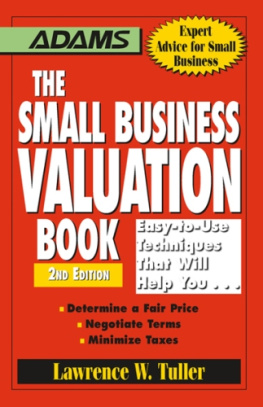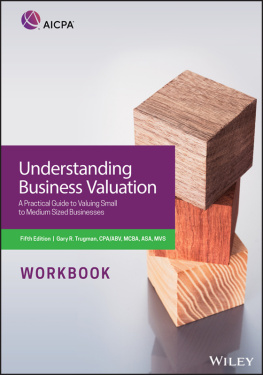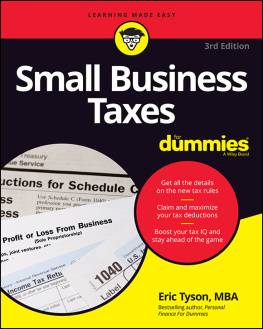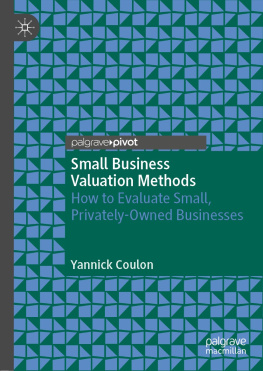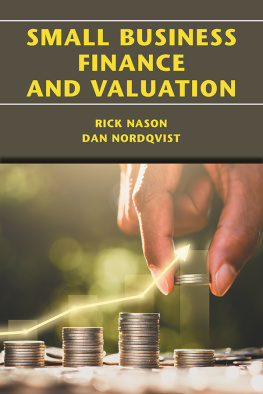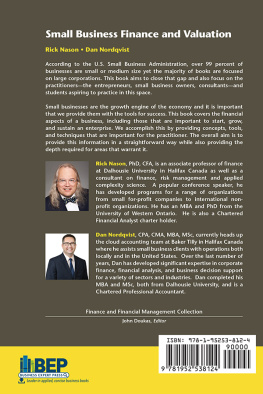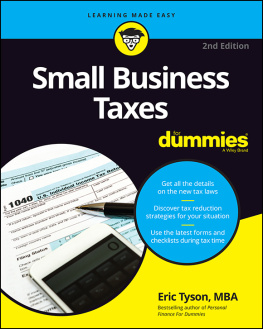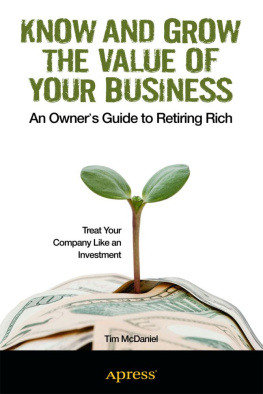
THE SMALL BUSINESS VALUATION BOOK 2ND EDITION
Easy-to-Use Techniques That Will Help You Determine a Fair Price Negotiate Terms Minimize Taxes
LAWRENCE W. TULLER

Copyright 2008, 1994 by Lawrence W. Tuller.
All rights reserved.
This book, or parts thereof, may not be reproduced in any form without permission from the publisher; exceptions are made for brief excerpts used in published reviews.
Published by Adams Media, an FW+ Publications Company 57 Littlefield Street, Avon, MA 02322. U.S.A. www.adamsmedia.com
ISBN-10: 1-59869-766-8
ISBN-13: 978-1-59869-766-7 (paperback)
ISBN-13: 978-1-44050-114-2 (EPUB)
Printed in Canada.
J I H G F E D C B A
Library of Congress Cataloging-in-Publication Data is available from the publisher.
This publication is designed to provide accurate and authoritative information with regard to the subject matter covered. It is sold with the understanding that the publisher is not engaged in rendering legal, accounting, or other professional advice. If legal advice or other expert assistance is required, the services of a competent professional person should be sought.
From a Declaration of Principles jointly adopted by a Committee of the American Bar Association and a Committee of Publishers and Associations
Many of the designations used by manufacturers and sellers to distinguish their product are claimed as trademarks. Where those designations appear in this book and Adams Media was aware of a trademark claim, the designations have been printed with initial capital letters.
This book is available at quantity discounts for bulk purchases. For information, please call 1-800-289-0963.
PART I
Business Valuation Principles
1
Exposing the Eight Myths of Business Valuations
Valuing a small, privately held business is very much like painting a picture. It is a creative endeavor, not a science. No single method or procedure for accomplishing this task exists. Generally accepted principles, such as those found in the accounting profession, do not apply to business valuations. It isn't until the brush has had time to do its work that the two parties to a transaction the business owner on one hand and a business buyer, partner, lender, the IRS, or the courts on the other hand negotiate the fair market value of a business.
As with an artistic endeavor, creativity plays a major role in business valuations. Such creativity occurs within the parameters of long-standing customs. Unfortunately, these parameters are not thoroughly understood by business owners. And any subject that is not thoroughly understood carries with it a mystique built on myths. This book dispels these myths. It takes the mystery out of business valuations by describing a variety of appraisal methods in clear, nonmathematical language.
Valuing small, privately held businesses requires a mindset significantly different from that of securities analysts or real estate appraisers. Securities analysts rely on mathematical formulas and statistical derivations to value traded securities, but these are largely minority interests and do not reflect the total value of a company; real estate appraisers relate the value of land and buildings to construction indexes, a grossly inappropriate method for valuing a growing concern.
Meaningful valuations of small, privately held businesses based on future cash flow discounted for risk are also at variance with the tax code and the courts. The IRS requires that specific formulas be used to value an estate or business interest for tax purposes, but these calculations determine value at a point in time, ignoring future benefits. Courts of equity attach random values to minority or majority business interests for divorce settlements and other legal remedies, but their randomness breeds inconsistency and pays little heed to the ongoing benefits generated by a business. None of these methods considers the total value of a going concern and the peculiar characteristics of closely held businesses.
Over the years, authors, accountants, lawyers, the IRS, the courts, and management consultants have tried to turn business valuations into a science with definitive, universally accepted methodologies. But all they have succeeded in doing is to cloak them in unfounded myths. Here are eight of the most insidious:
- The only time a business owner needs to value his business is when he is ready to sell it or when his banker wants a valuation in support of a loan application.
- A company's earnings determine how much the business is worth.
- XYZ Corporation sold for $5 million, so my company must be worth the same amount.
- The most logical way to value a company is to multiply its earnings by five.
- Only companies that turn a profit are worth anything.
- Business owners know the value of their companies better than any outsiders, including professional appraisers.
- The best way to value a company is to multiply its annual revenue by two.
- The market value of a company is in the eye of the beholder and not determined by fancy mathematical formulas.
Before tackling professional appraisal procedures that is, the set of methodologies within which acceptable valuation parameters operate we must dispel these myths.
When Selling a Business or Applying for a Loan
Banks view valuing your business as a crucial step in a loan application. Valuations are also required when you decide to sell the business. The necessity for reliable valuations in both situations seems obvious. Without an appraisal of a company's underlying assets banks can't know how much collateral supports the loan. And without a reasonably calculated market value, business buyers would not have any logical base from which to negotiate a purchase price.
However, if those are the only times you take a hard look at how much your business is worth, you are missing a key ingredient for managing the business.
Knowing the market value of your business helps in deciding when the time has come to retire and sell the entire company. Knowing the value of your business will guide you in restructuring the company to protect its assets from nefarious or frivolous lawsuits. Knowing how much each product line of your business is worth in the marketplace can be invaluable information for deciding whether to intensify marketing efforts for a product line or abandon it altogether.
A recent business valuation will prove the worth of the company for estate tax purposes. Whether a business survives or fades away with the demise of its owner, at the time of death it has some value. It may have hard assets (e.g., equipment, machinery, or real estate). It may have valuable patents or trademarks. Or it may have substantial customer goodwill, built up over years of profitable operation. All of these assets must be included in the taxable estate of the business owner.
Perhaps you have one or more business partners. Your partner could be a spouse or children, or partners might not be related to you at all. When the time comes to dissolve the partnership or to buy out one or more partners or to restructure your business, some type of buy/sell agreement must be in place. Such an agreement includes a method for determining the value of the business at the time of dissolution or buyout. To be certain the valuation meets with IRS approval, it should be updated periodically to reflect changes in the profitability and the acquisition or disposal of company assets.

